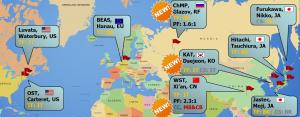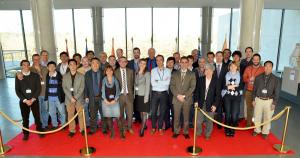Six years later and still delivering
It's the longest running ITER Organization-Domestic Agency meeting at a technical level.
For the last six years, the Domestic Agencies responsible for delivering ITER's high-tech superconductors have met twice a year to share experience, talk over challenges and mutualize technological expertise.
Despite a multiplicity of ITER conductor types (poloidal field, toroidal field, central solenoid, correction coils, feeders), strand production sites (nine), conductor jacketing lines (five), and participating Members (China, Europe, Korea, Japan, Russia, US), the semi-annual Conductor Meeting has been able to promote synergies and enable constructive dialogue.
And the results are tangible. At the Conductor Meeting organized on 18-20 March, Arnaud Devred, head of Superconductor Systems & Auxiliaries at ITER, reviewed the latest accomplishments.
After five years of ramping up, strand production for the toroidal field conductors is almost completed. Nearly 480 tonnes of niobium-tin (Nb3Sn) strands (>100,000 km) have been registered in the Conductor Database and one producing Domestic Agency, Korea, has entirely completed its share. The cabling and jacketing of conductor unit lengths (ULs) is underway in the six Domestic Agencies involved. Sixty-three 760-metre ULs and twenty-six 415-metre ULs have been registered and are now stored for coil winding, an amount corresponding to approximately 12 toroidal field coils.
China reports that it has completed half of the correction coil conductor ULs and two correction coil busbar conductors; Japan has completed one 613-metre UL and one 918-metre UL for central solenoid module CS3L.
Over the years, the ITER Organization has validated 8,475 control points, relying on 29,550 strand critical current measurements. "Thanks to the Conductor Database and close relationships between the ITER Organization and the Domestic Agencies, these control points were cleared in a timely manner, allowing industrial production to proceed worldwide," says Arnaud.
The next Conductor Meeting is planned for October 2014.



